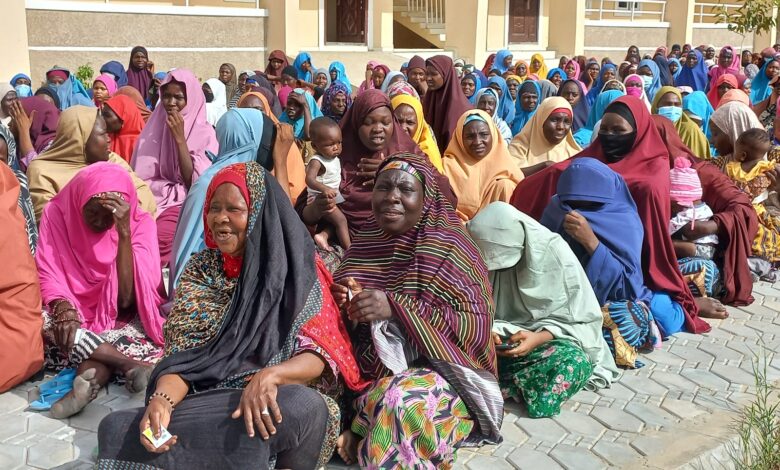UNICEF Winds Up Skill Acquisition Program For Displaced Women, Girls In Northeast Nigeria
UNICEF said it has equipped 102,859 children and 29,985 adolescent youths with skills in its three-year program on the "Response, Recovery and Resilience” project, which ends in May 2022.

The United Nations Children’s Fund (UNICEF), on Monday, May 23, said young women and girls constituted the highest percentage of beneficiaries in its ‘Response, Recovery and Resilience’ (RRR) project, which provided educational opportunities and economic empowerment skills to people with vulnerability.
The European Union (EU) funded programme, which started in 2019, would be winding up at the end of May 2022. UNICEF is also introducing a new programme that would consolidate the gains of the RRR project.
Paola Ripamonti, UNICEF’s Education Manager in Borno state, told a press conference that the project, which wraps up this month, “has provided 102,859 children (51 per cent girls) with access to inclusive, equitable and quality education in a safe and protective learning environment.”
“A total of 29,985 out-of-school youths and adolescents (55 per cent females) were supported with vocational skills, including poultry farming, shoemaking, soap and bag production, tailoring, painting, and interlock tiles production.”
Ripamonti said majority of the trained youths are back in their communities and earning income to provide for their family’s basic needs.
“Some of them have even returned to school and are supporting their education with income earned from their businesses,” she said.
The concluding programme was designed to ensure that vulnerable children in Borno State have equal opportunity to quality education and be the best version of themselves.
At the press conference, UNICEF announced the flag-off of a new program to dovetail the RRR.
The Education “EduTrac mobile phone-based data collection system and the mainstreaming of psychosocial support into formal education in Borno State” was idealised to “improve educational planning, expand access to education for conflict-affected children and strengthen learning outcomes while also improving their mental health.”
She said the new programme would consolidate the achievements made in the RRR project.
She hinted that “among other achievements of the project, 30 schools have been constructed or rehabilitated, provided with furniture and have sex-segregated WASH facilities.”
“Fifty-eight temporary learning spaces were constructed or rehabilitated, and 28 vocational centres were established across six LGAs.”
She added that the RRR interventions supported over 300,000 children and youths (52 per cent females).
Among them are 20,104 (53 per cent are girls) out-of-school children who now access informal learning classes and 16,630 children (52 per cent girls) who transitioned into the formal education system, and over 29,000 youths (55 per cent are female) who gained employable skills through vocational training.
Additionally, 750 members of School-based Management Committees (44 per cent females) have improved school management skills; 1,630 teachers and Community Volunteer Teachers (49 per cent females) strengthened their skills on various themes such as psycho-social support, gender-sensitive pedagogy and effective classroom management.
The education sector in Northeast Nigeria is one of the worst hit by protracted armed conflict. UNICEF and the European Union Support have led several interventions on “Response, Recovery and Resilience” project in Borno State led to a partnership with the State Government to provide an integrated education response.
This generated demand for inclusive and equitable quality education from communities; the strengthened capacity of education personnel to gather and analyse school data for better educational planning and empowered school managers and community leaders as active participants in the education response.
UNICEF explained that the EduTrac tool is a mobile phone-based data collection system which allows teachers, headteachers and focal points of the school management system to send data to education administrators for prompt interventions directly.
Husseini Adamu, one of the IDP beneficiaries of the RRR project, told HumAngle that he had never been to school all his life until he was enrolled in the RRR project, which coached him on poultry farming.
“Now I am making money off the sales of chicken from my poultry to fund my education at the Adult Education Center,” he said.
Support Our Journalism
There are millions of ordinary people affected by conflict in Africa whose stories are missing in the mainstream media. HumAngle is determined to tell those challenging and under-reported stories, hoping that the people impacted by these conflicts will find the safety and security they deserve.
To ensure that we continue to provide public service coverage, we have a small favour to ask you. We want you to be part of our journalistic endeavour by contributing a token to us.
Your donation will further promote a robust, free, and independent media.
Donate HereStay Closer To The Stories That Matter




